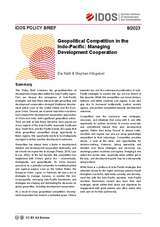Geopolitical competition in the Indo-Pacific: managing development cooperation
Nath, Ela / Stephan KlingebielPolicy Brief (8/2023)
Bonn: German Institute of Development and Sustainability (IDOS)
DOI: https://doi.org/10.23661/ipb8.2023
Dt. Ausg. u.d.T.:
Der geopolitische Wettbewerb im Indopazifik und dessen Einfluss auf die Entwicklungspolitik
(Policy Brief 9/2023)
This Policy Brief examines the geopoliticisation of development cooperation within the Indo-Pacific region. First, we discuss the emergence of Indo-Pacific strategies and how these intersect with geopolitics and development cooperation amongst traditional develop-ment actors such as the United States and the Euro-pean Union. Second, we examine how these narratives have shaped the development cooperation approaches of China and India, both significant geopolitical actors. Third, we look at how these dynamics have played out in key regions of the Indo-Pacific, especially Southeast Asia, South Asia, and the Pacific Islands. We argue that while geopolitical competition brings opportunity to these regions, this opportunity needs to be strategically managed to deliver positive development outcomes. Geopolitics has always been a factor in development debates and development cooperation historically, and we should not expect this to change (Power, 2019; Liao & Lee, 2022). In the last decade, this competition has heightened with China’s global rise – economically, strategically, and geopolitically. As China became perceived as a potential competitor to traditional global and regional powers such as the United States, the European Union, Japan, or Australia, we saw a rise in strategies to manage, balance, or counter this rise. Consequently, emerging Indo-Pacific frameworks and strategies are shaping and dominating the discourse on global geopolitics, including development cooperation. As a result of sharp geopolitical competition, develop-ment cooperation has become a contested space. China’s powerful rise and the subsequent proliferation of Indo-Pacific strategies to counter this rise are key drivers of this dynamic. While this competition can breed division, between and within countries and regions, it can also give rise to increased multipolarity, partner country agency, and positive competition towards development outcomes. Competition and the numerous new strategies, resources, and initiatives that come with it, can offer opportunity for partner countries to secure resources and commitment toward their own development agenda. Rather than being “forced” to choose sides, countries and regions can and are using geostrategic competition to their advantage. Competition provides choice, a seat at the table, and opportunities for decision-making. However, taking ownership and direction over these strategies and resources can challenge partner countries and regions. Hedging is one option but carries risks, especially when politics get in the way, and development gains may be subsequently compromised. While there is a plethora of Indo-Pacific strategies that articulate visions for the region and ways powers should strengthen economic, diplomatic, security, and development ties with the Indo-Pacific countries, Indo-Pacific countries themselves should also have their own strategies, which outline their vision and objectives for engagement with great powers and other actors who seek and vie for their partnership.


